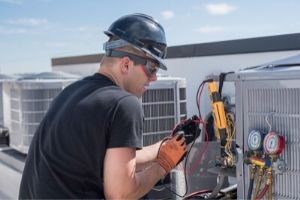The Right Tools for the Job
Maintaining an HVAC system is complex work. Many people do not realize the intricacies that are involved with making sure an HVAC is working properly. It can be a dangerous decision to try and work on your system yourself, especially with little to no prior knowledge on the subject.
HVAC systems are so intricate in fact, that many HVAC companies will have many different types of workers. Each worker will specialize in a different area of HVAC work.
The different types of HVAC specialties include:
- Automotive HVAC technician
- HVAC Engineer
- HVAC Installer
- HVAC Mechanic
- AC Technician
Each specialty has its own set of tools needed for the job too, and some of them you may not have lying around in your garage. Be sure to keep reading to learn more about what tools are needed for what jobs and when to call in a professional for a gas furnace repair.
The Necessary Tools for the Job

It is almost expected that whenever you call in a technician of any kind, that the tech will be equipped with the bare minimum tools. These tools include a hammer, screwdriver and set of pliers. An HVAC technician is no different, but he should also come prepared with a tape measure and most likely a stepladder, wire strippers, and a thermometer as well.
Every professional should always show up with these essential tools in his toolbelt. If you call someone to come out and look at your HVAC system and he doesn’t have these tools on him, he likely isn’t a professional.
It is best to go through a well-known HVAC company than to trust a flyer that gets dropped in your mailbox by a self-employed HVAC technician. Sometimes these workers actually know what they’re talking about, but if you go through a company then you know you are getting the best quality work.
Tools for Specialty Jobs
Along with the essential tools for the job, every HVAC technician should also come prepared with a set of specialty tools for the job. No matter what his specialty is, if he has the below list of specialty tools, he should be able to fix even the unforeseen problems that arise during maintenance.

The most important specialty tools every HVAC tech should have are:
- Multimeter
- Thermometer
- Cordless Drill
- Sawzall
- Manifold Gauge
- Extension Cord
- Tubing Cutter
A cordless power drill is by far one of the most useful tools for working on an HVAC system. It gets used on almost every job to repair and install new equipment. Out of all of the tools though, the multimeter, thermometer, and manifold gauge are some of the most important and most used specialty tools.
Each one of these tools properly assesses the HVAC system to let the technician know where a problem could potentially be coming from. Taking the guesswork out of the job so he can get the job done properly and quickly.
Safety Tools Required for the Job

Above all else, a professional HVAC technician will make sure to take the proper safety precaution tools before even beginning the job. It is vital he comes prepared with slip-resistant shoes, as well as gloves and an arm sleeve just in case a sharp object comes down on his arms or hands.
On top of these items, a professional will always assess the situation at hand and go over his tools before starting a job. He won’t take shortcuts and will ensure he gets the job safely and properly within a timely fashion.
Not only this, but he will be covered by his company if something does happen to you, him or the house. The company will step in and cover any issues that arise until everything is as it should be.
Elite Electric & Air is Here to Help
Port St. Lucie’s local HVAC company, Elite Electric & Air is open 24/7 to answer any questions and concerns you might have. They have been helping customers around Port St. Lucie, FL for the last thirty years, and with great reviews. Their expertly trained technicians provide peace of mind to their customers because their focus is always on safety and quality work.

